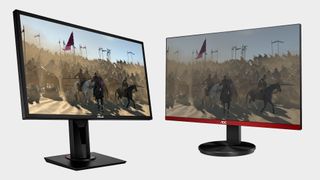Dell wants to change how we repair and recycle laptops in the future
Concept Luna shows the potential of a 100% sustainable laptop.
"We don't throw away an entire car when we need new brakes or tires," says Dell, and yet laptops are more or less designed to be junked when they're out of date. The American tech company says it wants to change that, giving its laptops longer life cycles while reducing their carbon footprint.
Luna is a proof-of-concept collaboration between Dell and Intel that was announced last year. The idea is to design components for laptops that are easily replaceable and reusable so that they may live in other products, drastically reducing the amount of electronic waste in the world. Dell has made some big strides over the past year, showing me a working prototype of what could be the future of laptop sustainability.
At a CES pre-briefing last week, Dell told me that the prototype laptop is 100% modular and that every part of it, from chassis to speakers, can be removed, replaced, and reused to fuel what it calls " a robust circular economy," reducing the need for "new, raw materials."
Once the modular system is popped open, there are no screws, cables, or adhesives to deal with inside—the components slot in and out without any tools. As you can see in the video embedded above, an entire 13-inch notebook can be dissembled in less than a minute.
According to Dell, it takes its recycling partners "more than an hour to disassemble a PC with today's technology" because current laptops are held together with "screws, glue, and various soldered components." Dell's new prototype system makes repairing and dismantling a system much faster that a robot could take apart a bunch of these daily. To prove that point, Dell brought a robot.

Best gaming monitor: Pixel-perfect panels for your PC
Best high refresh rate monitor: Screaming quick screens
Best 4K monitor for gaming: When only high-res will do
Best 4K TV for gaming: Big-screen 4K PC gaming
For safety reasons, Dell says that the robot was operating at 1/20th of its normal operating speed. The basic idea is this: Let's say you're turning in your old work laptop for a new one, and your company recycles the old laptop. The old system gets given to this robot, which will diagnose and dismantle the machine. Based on the health of each individual component, the bot will set aside things like the keyboard, speakers, and display that could be used again in future products it will assemble later. So if the speakers are still good, they will keep finding finding their way into a new breed of partially-refurbished laptops.
It seems like Dell is also acknowledging a future where 'right to repair' laws gain more traction. Making these modular system components easily accessible to the public and third-party repair shops would help it maintain control in a world where people may come to expect upgradability and repairability from mobile electronics
The biggest gaming news, reviews and hardware deals
Keep up to date with the most important stories and the best deals, as picked by the PC Gamer team.
What's most important here for Dell is scalability: The company hopes to one day apply the same modular design to all of its laptops regardless of size, and that includes its gaming laptops. Imagine just swapping out an older GPU with a new one or upgrading your perfectly good gaming laptop with a faster display without having to buy a brand-new system.
"A single sustainable device is one thing, but the real opportunity is the potential impact on millions of tech devices sold each year, and optimizing the materials in those devices for future reuse, refurbishment or recycling."

Jorge is a hardware writer from the enchanted lands of New Jersey. When he's not filling the office with the smell of Pop-Tarts, he's reviewing all sorts of gaming hardware, from laptops with the latest mobile GPUs to gaming chairs with built-in back massagers. He's been covering games and tech for over ten years and has written for Dualshockers, WCCFtech, Tom's Guide, and a bunch of other places on the world wide web.
Most Popular






